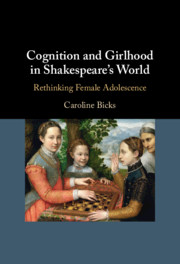Book contents
- Cognition and Girlhood in Shakespeare’s World
- Cognition and Girlhood in Shakespeare’s World
- Copyright page
- Dedication
- Contents
- Figures
- Acknowledgements
- Introduction
- Chapter 1 “A spectacle to men and angells”
- Chapter 2 “Imagination helps me”
- Chapter 3 “The progresse of an Art”
- Chapter 4 “If I should tell / My history”
- Chapter 5 “Put on the minde”
- Chapter 6 “From thirteene Yeares … resolved to serve God”
- Coda
- Notes
- Bibliography
- Index
Coda
“to think upon----------&c”
Published online by Cambridge University Press: 24 June 2021
- Cognition and Girlhood in Shakespeare’s World
- Cognition and Girlhood in Shakespeare’s World
- Copyright page
- Dedication
- Contents
- Figures
- Acknowledgements
- Introduction
- Chapter 1 “A spectacle to men and angells”
- Chapter 2 “Imagination helps me”
- Chapter 3 “The progresse of an Art”
- Chapter 4 “If I should tell / My history”
- Chapter 5 “Put on the minde”
- Chapter 6 “From thirteene Yeares … resolved to serve God”
- Coda
- Notes
- Bibliography
- Index
Summary
The Coda briefly explores how depictions of female adolescent brainwork grew more negative over the course of the seventeenth century, particularly in some medical and sexual handbooks. This loss of girls’ minds to their raging adolescent physiognomies suggests some kind of shift in popular thinking about female adolescent cognition — or, at least, in how to market it. At the same time, other writers (including some medical ones) continued to feature girls’ focused and dynamic brainwork. The Coda concludes by considering the 1687 journal entry of a Protestant Englishman who recorded his visit to an English Carmelite convent in Antwerp, where he encountered a young novice who challenged his concerns that she was being buried alive and claimed she would not wish to change places with any woman. His description of the conversation that “materially passed between us,” and of her pledge to remember and pray for him, suggests that notions of embodied and extended cognition were still in circulation, even as theories like Cartesian dualism and the mechanistic body were developing in the latter half of the century. And that English girls’ dynamic brainwork continued to be recognized and valued — if, perhaps, in more limited contexts.
Keywords
- Type
- Chapter
- Information
- Cognition and Girlhood in Shakespeare's WorldRethinking Female Adolescence, pp. 222 - 230Publisher: Cambridge University PressPrint publication year: 2021

